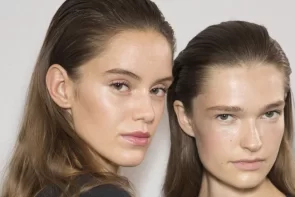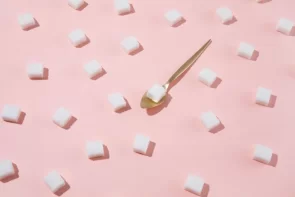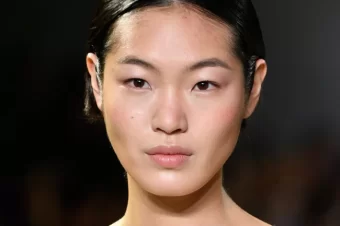Chocolate, Lactose, And The Like - Which Foods Really Have An Impact On The Complexion Of Your Skin
Our diet has an impact on our skin - from the appearance of acne to premature aging.
Chocolate, lactose, and the like - which foods really have an influence on the skin's appearance
Skincare is not just about what we put on the skin, it is also about how we nourish our bodies. But which foods are bad for the skin? An expert explains lactose, sugar, and dietary supplements.
Skincare is not just about choosing good care products, but about a whole series of good habits that promote the well-being of the skin, protect it from external influences, and prevent premature skin aging. Sun, pollution, stress, tobacco or alcohol, and yes, a diet too, all play an important role in this. The effects of our diet may not seem so obvious at first, but the truth is, it is closely related to the appearance of the skin. "About 70% of our aging is caused by external factors, including food," confirms Helena Rodero, a dermo-cosmetics pharmacist from Naturadika, who explains to us which foods are "bad" for the skin or can have a negative impact on it (and of course also to those that are beneficial for our skin).
Diet influences the appearance of our skin: sugar and (quickly soluble) carbohydrates
It's no secret that sugar is one of the main ingredients that we should reduce in our diet. What we may not know, however, is that both sugars and readily available carbohydrates - simple carbohydrates - can have negative effects on the skin. According to Helena Rodero, "consuming it has a direct effect on the collagen in our skin, the protein that gives us hold and firmness. Once this sugar is absorbed, the body tries to remove it as quickly as possible. One of the mechanisms It uses to eliminate the part that cannot be stored by excess is the caramelization of collagen, a reaction that renders the collagen inoperable and creates its stiffness."
A more well-known effect, but not always, is the appearance of pimples (hence the belief, for example, that chocolate causes pimples). In this case, the dermo-cosmetics expert states that "all foods with a high glycemic index (i.e. high levels of free sugar that is quickly absorbed and creates a glucose spike in the blood) are likely to cause acne or acneiform lesions". However, she notes that this "does not mean that these types of reactions will always occur, but when an acne breakout is observed, all possible causes must be controlled in order to best respond to them".
Does Lactose Really Cause Blemishes?
Lactose has not enjoyed a particularly good reputation, especially since plant-based milk alternatives have become popular. We tend to associate them with the appearance of acne, among other things, but in this case, their effect has more to do with their sugar content, as the Naturadika expert points out that "the fact that lactose is present as such or is hydrolyzed into glucose and galactose (lactose-free milk), making it a high glycemic index food, especially in the case of skimmed milk. However, Helena Rodero points out that this reaction may not necessarily be an everyday occurrence unless it is one overdoing it and if one is not lactose intolerant: "The occasional consumption of food such as milk, if the person is not intolerant to lactose or its protein (which in turn could trigger a reaction on the skin), should not cause a major reaction at this level. However, there are people who are more susceptible to the effects of high glycemic index foods and notice a negative effect causing acne even with a small consumption, but I think that only happens in very specific cases, "she emphasizes.
Too many processed products and not enough fruits and vegetables: a bad combination
"Our skin is exposed to oxidizing factors such as solar radiation and stress. The better we eat, the better we can fight the free radicals that cause oxidation," explains the specialist. We should consume plenty of fruits and vegetables as they are the greatest source of antioxidants. "If we don't consume them regularly, we are exposed to external causes that negatively affect us," says Rodero. Therefore, the main mistakes we can make are "consuming a lot of sugar and processed foods and being deficient in fruits, vegetables, and fish. The best diet for our skin is a balanced diet," she says.
Food that is good for the skin
While a balanced diet is best, it is still possible to refine your intake a bit depending on the specific benefits we're looking for. On the one hand, the expert recommends antioxidants from nature, which are often used in food supplements, such as "beta-carotene (precursor of vitamin A, contained in fruits and vegetables with orange color), hydroxytyrosol (olive tree, olive oil), quercetin (onion). , Resveratrol (grape skin and blueberries) or epigallocatechin gallate (green tea) ". Other very positive ingredients are trace elements or minerals such as silicon (bamboo), which supports the elasticity of our skin, selenium (protects the membrane of our cells), and zinc, which is not only involved in our immune system but also has an anti-acne effect Has".
Do Diet Supplements Really Help?
With all dietary supplements - be it for improving the skin, hair, or also for weight loss - we have to keep in mind that they do not have as much effect on their own, but have to be supported by healthy habits. Here, too, the following applies: the better the diet, the more effective food supplements are. We should change our habits towards a diet rich in all the antioxidants that nature offers us. If we do this and additionally use a good nutritional cosmetic, we will be able to notice the effects on our skin in a month or two. If we don't change our diet, it will take longer because the active ingredients of the remedy work first in the areas of our body with the highest priority. In addition, through a balanced diet, our intestinal microbiota helps us to better absorb food supplements", explains Helena Rodero.
Comments















